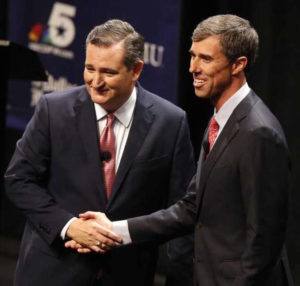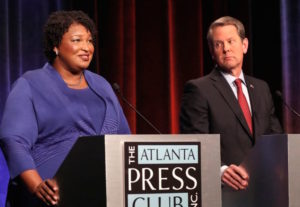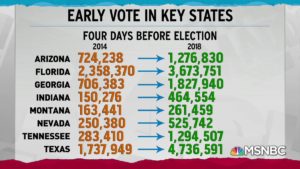Americans go to the polls on Tuesday in one of the most eagerly anticipated midterm elections in US political history.
This will be the first national electoral test since Donald Trump became president in 2016 and is widely considered to be a referendum on his first two years in office.
All 435 seats in the House of Representatives are up for grabs, as well as a third of the 100 seats in the US Senate. Democrats need to flip a net total of 23 seats to regain control of the House, but face a much more difficult path to a majority in the upper chamber. In addition to the congressional races, 35 states will vote for Governors, not to mention hundreds of state legislature seats.
In this bitterly divisive political climate the stakes for both parties are incredibly high. In recent weeks both President Trump, and former President Barack Obama have been hitting the campaign trail in key states in efforts to get out the vote; the latter telling a recent crowd in Miami that this “might be the most important election of our lifetime.”
It has certainly been the most expensive midterm campaign ever, with the combined spending by parties, candidates and outside groups set to top $5billion.
In the most recent polling, FiveThirtyEight is forecasting that the Democrats have an 85 per cent chance of taking back control of the House of Representatives, while Republicans have an 84 per cent chance of keeping hold of the Senate.
Here are some of the key races to watch out for on Tuesday night.
Sen. Ted Cruz (R) v. Rep. Beto O’Rourke (D) for Texas Senator
 Not since Senator Barack Obama ran for President in 2008, has a Democrat captured voters imagination like three-term Congressman Beto O’Rourke. Texas, traditionally a dependable Republican state, has not elected a Democratic Senator since 1988. Yet against the odds, O’Rourke has managed to put the seat Sen Cruz has held for five years in play.
Not since Senator Barack Obama ran for President in 2008, has a Democrat captured voters imagination like three-term Congressman Beto O’Rourke. Texas, traditionally a dependable Republican state, has not elected a Democratic Senator since 1988. Yet against the odds, O’Rourke has managed to put the seat Sen Cruz has held for five years in play.
This is a race about opposing American ideals. O’Rourke is running a campaign based primarily on progressive values, whereas Cruz is running one based on traditional Texan conservative politics. O’Rourke’s defense earlier this year of the right of NFL players to protest as an expression of free speech brought him significant national attention. Yet as the immigration debate rages nationally, focused on the president’s move to send troops to the southern border, all eyes will be on Texas to see whether Cruz can survive a potential blue wave.
Richard Ojeda (D) v. Carol Miller (R) for West Virginia’s 3rd Congressional District
In 2016 Donald Trump won West Virginia’s 3rd Congressional district with 73% of the vote. A district steeped in poverty and high unemployment, candidate Trump had promised to breathe life back into the state’s declining coal industry. As West Virginians begin to see coal jobs re-appear, the question remains; what Democrat could possibly win here? Enter Richard Ojeda, retired army major, lifelong populist Democrat and a former Trump voter who is putting up a strong challenge against Republican candidate Carol Miller.
Ojeda’s image is that of a voice for the working class voter. While he has praised Trump for bringing back coal jobs, he believes the President has done little else to alleviate the day to day struggles that plague the poorest West Virginians such as inadequate access to healthcare and the devastating opioid epidemic. A strong proponent for teacher unions, Ojeda’s style of campaigning is unapologetic and authentic. But can he win over Trump supporters who voted for the president because he was those very things?
Stacey Abrams (D) v. Brian Kemp (R) for Georgia Governor
 Georgia’s gubernatorial race is one of historical significance. Democrat Stacey Abrams is seeking to become the first woman and person of color to become Governor of Georgia – as well as the first black woman to govern any state in America. Her opponent is Georgia’s current secretary of state Brian Kemp, a strong supporter of President Trump. Like elsewhere, key issues in this race have been gun control, education, immigration and healthcare.
Georgia’s gubernatorial race is one of historical significance. Democrat Stacey Abrams is seeking to become the first woman and person of color to become Governor of Georgia – as well as the first black woman to govern any state in America. Her opponent is Georgia’s current secretary of state Brian Kemp, a strong supporter of President Trump. Like elsewhere, key issues in this race have been gun control, education, immigration and healthcare.
But it has been a controversial campaign, particularly since it’s unusual for the person overseeing the election to also be a candidate in it.
In recent weeks the Kemp campaign has been accused of voter suppression when his office put over 50,000 voter applications, mostly belonging to African-American citizens, on hold because they didn’t meet the state’s controversial standards. Civil rights groups launched a federal lawsuit which ruled in their favour, paving the way for these applicants to vote.
And just this weekend, Kemp announced an investigation into the Georgia Democratic Party, claiming there had been an attempted hack of the voter registration system. As CNN reports, “Democrats in the state vehemently denied the claim, and Kemp’s office has not provided any evidence or indicated why the Democratic Party is being investigated as part of its probe.”
While much of Georgia remains Republican – Trump won the state by 5.16% in 2016, a lower margin than either Mitt Romney in 2012 or John McCain in 2008 – Abrams will be relying on a strong turnout from liberal voters in Atlanta, the birthplace of Martin Luther King Jr, as well as star-power from the likes of Oprah Winfrey, who campaigned for Abrams in the state last week.
Rep Ron DeSantis (R) v. Andrew Gillum (D) for Florida Governor
In my opinion, the race for Florida Governor sums up American politics in 2018. Both candidates won surprise victories within their own party’s primaries earlier in the year. Defeating established centrist candidates, Democrat Andrew Gillum represents a far left, progressive ticket, while Republican Ron DeSantis is a strong supporter of Donald Trump’s #MAGA agenda.
One of the big issues in this race is gun control, in the aftermath of the mass shooting at Stoneman Douglas High School in Parkland earlier this year. Healthcare has also been a major talking point as well as climate change, with Florida battling several severe tropical storms in recent years. DeSantis is also hoping for success off the back of the country’s strengthening economy, a key talking point of the Trump administration.
Yet this has been a heated and often ugly race with both candidates regularly sparring with one another. DeSantis has been accused of stoking fear over law and order and immigration, as well receiving heavy criticism for his ill-considered use of the phrase “monkey up” against his African-American opponent. This race – along with the other high-profile contests in the state – will be a referendum on whether Floridians have an appetite for the progressive politics that have emerged in the last couple of years, or endorse the unique style of their president and unpredictable adopted son.
Early turnout confounds pollsters
Although election day is Tuesday, a huge number of Americans have already voted, either by absentee ballot or in person by way of the early voting rules in many states, adds Steve McGookin.
The campaign has been marked by historic levels of enthusiasm among both camps, and this surge in early voting in key states has made predicting Tuesday’s outcomes even more difficult than usual.
With early voter turnout roughly doubling over the same period ahead of the last midterms in 2014, the actual impact on eventual results simply can’t be extrapolated, regardless of how optimistic individual candidates might appear.
In Texas, for example, where the 12-day early voting period ended on Friday, Beto O’Rourke told the Dallas Morning News, “If this continues, we win,” even though polls still show him trailing in what has become a very competitive race. After all, the huge early turnout numbers came at the end of the most intense week of GOP campaigning – and Fox News coverage – around the hot-button issue of the migrant caravan, which could have had a galvanizing effect on their supporters.
As Emily Stewart writes at Vox: “A surge in early voting does not necessarily translate to an advantage for one party or another. Many of the people who vote early are people who would have voted on Election Day anyway, and they’re often people who have already made up their mind – in other words, they’re not swing voters.”
One factor that should certainly be included in any prognostication ahead of Tuesday is President Trump’s personal approval rating – currently at 41.9% according to tracking data at FiveThirtyEight. This particular trend matters matters because, as pollster Gary Langer writes at ABC News: “59 percent of likely voters say it’s highly important to them to vote for a candidate who shares their opinion of Trump – down from a high of 64 percent in October, but still a solid majority. And Trump’s approval among likely voters is 9 points underwater.”
In short, though, it’s still anybody’s ballgame. And no matter how sophisticated and fascinating their model, anyone who tells you they know exactly how things will look on Wednesday is making it up.

